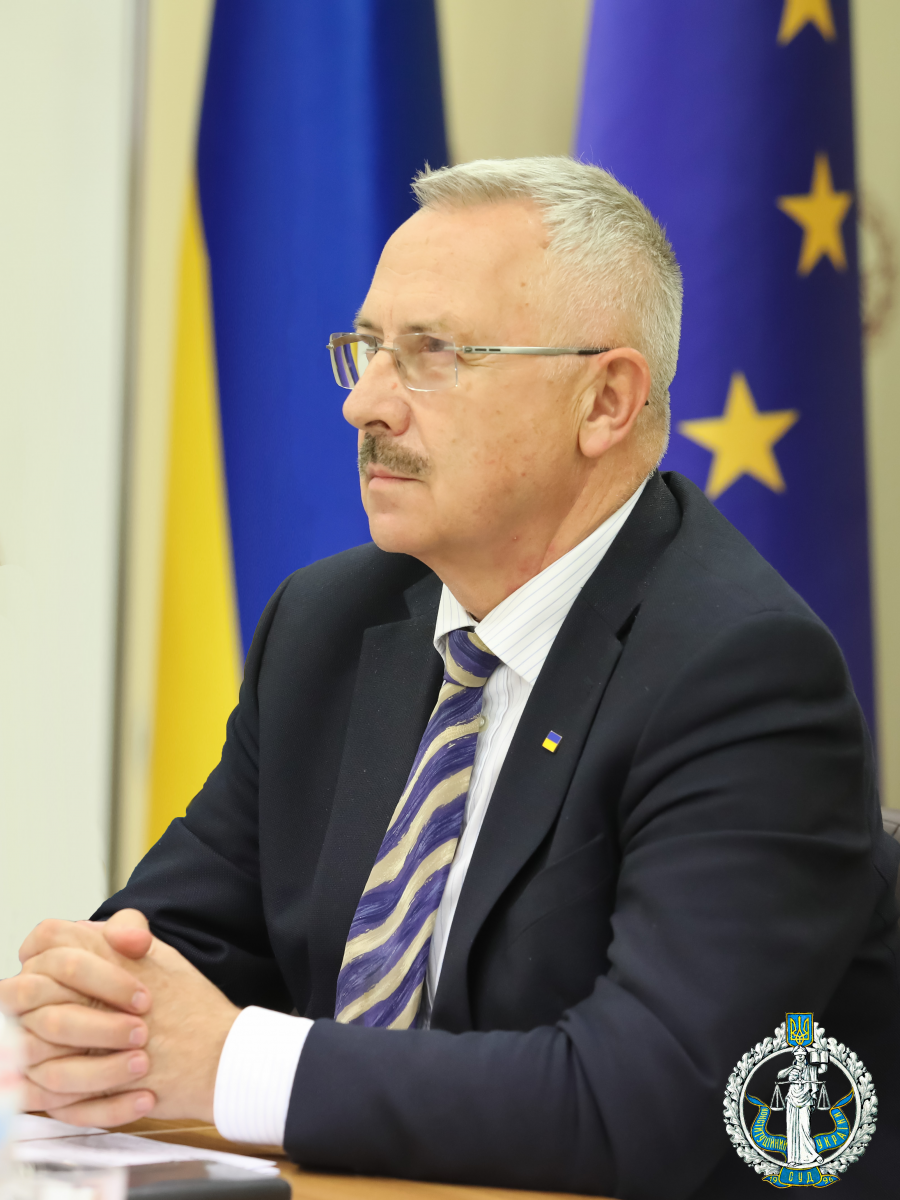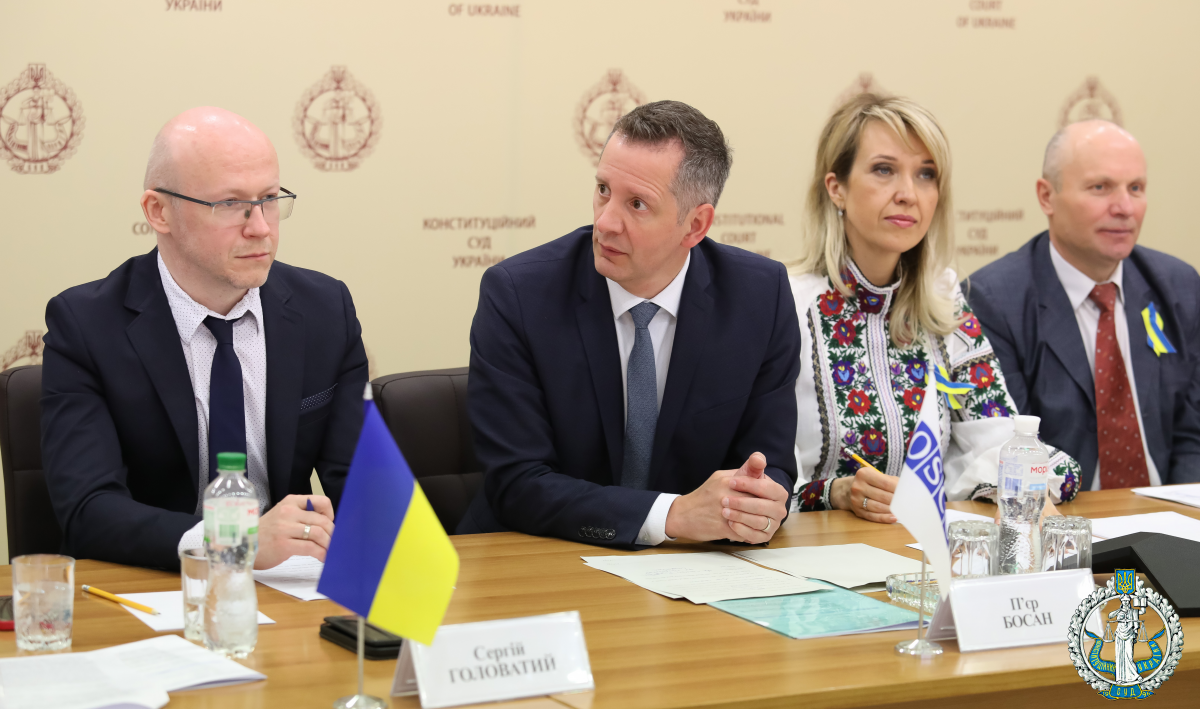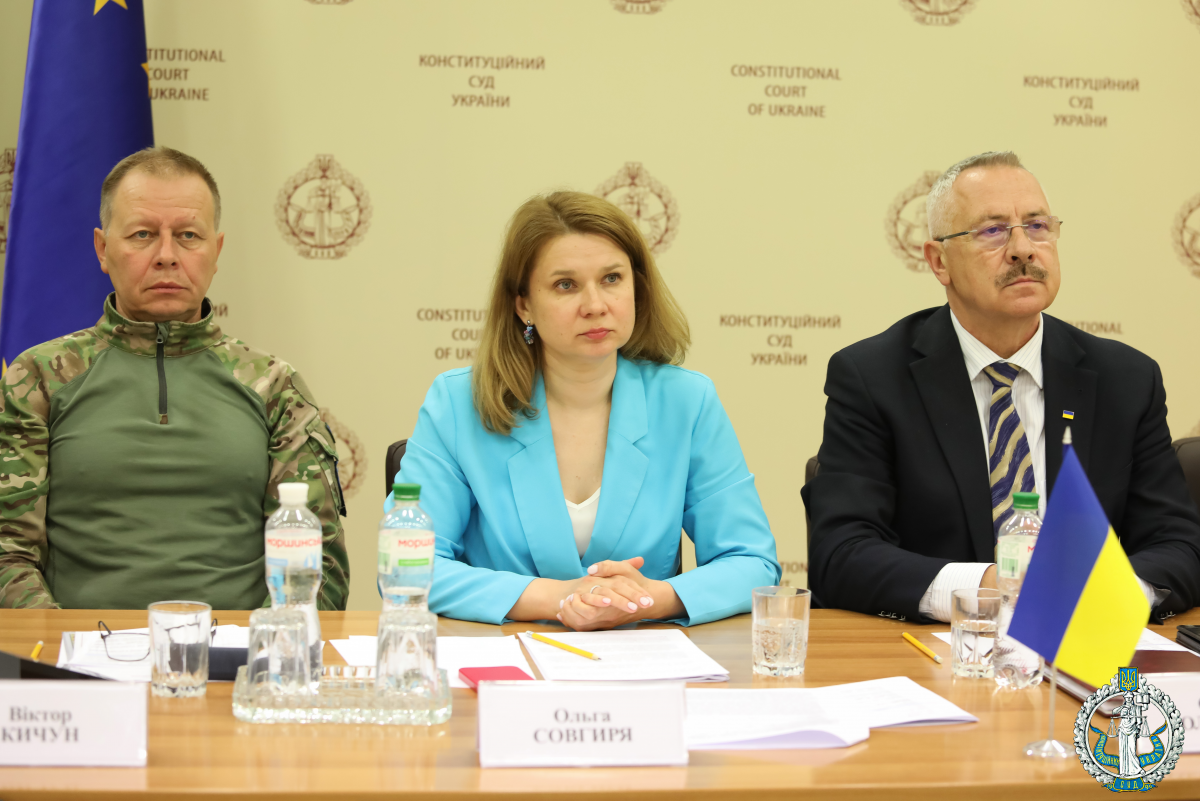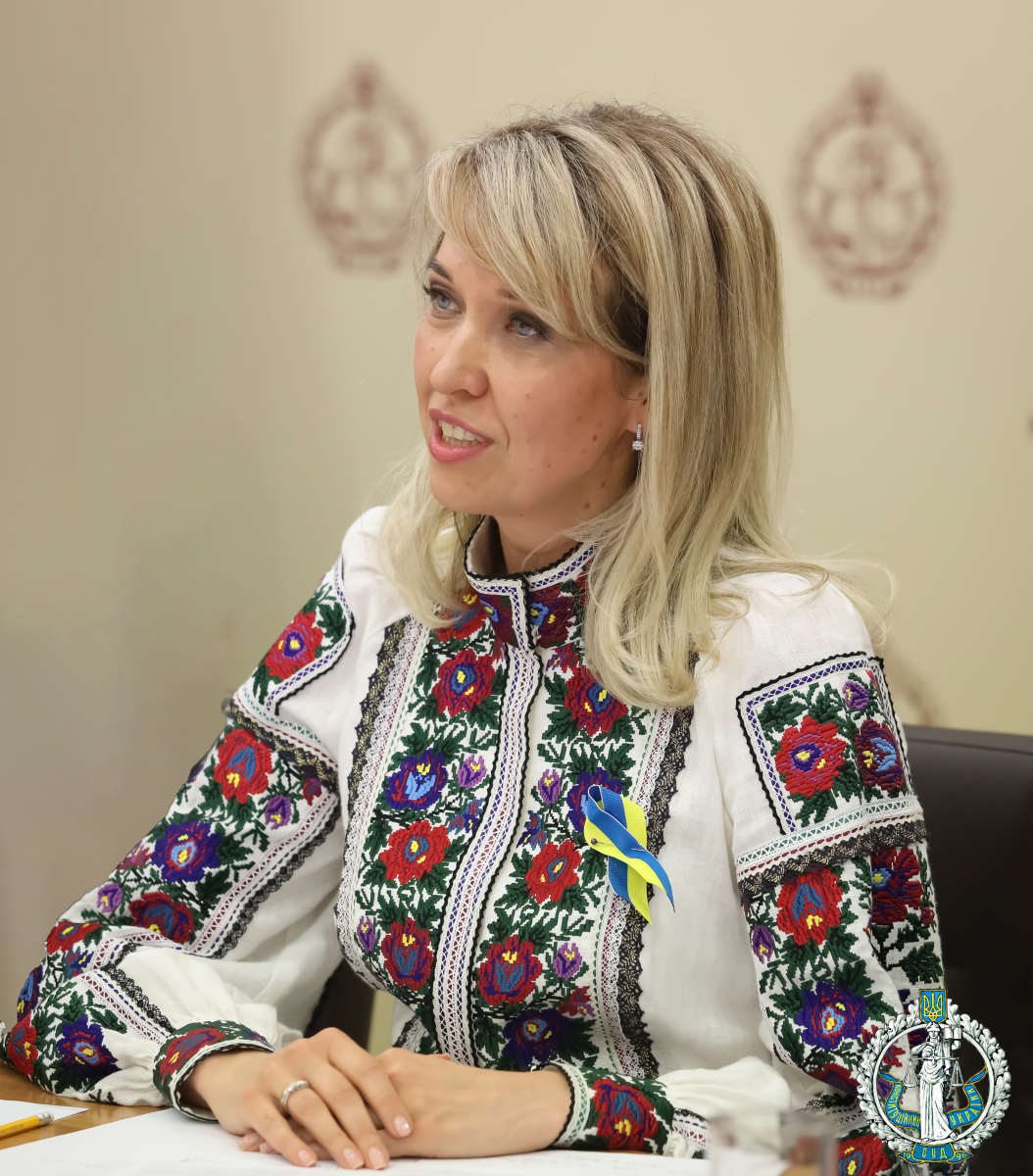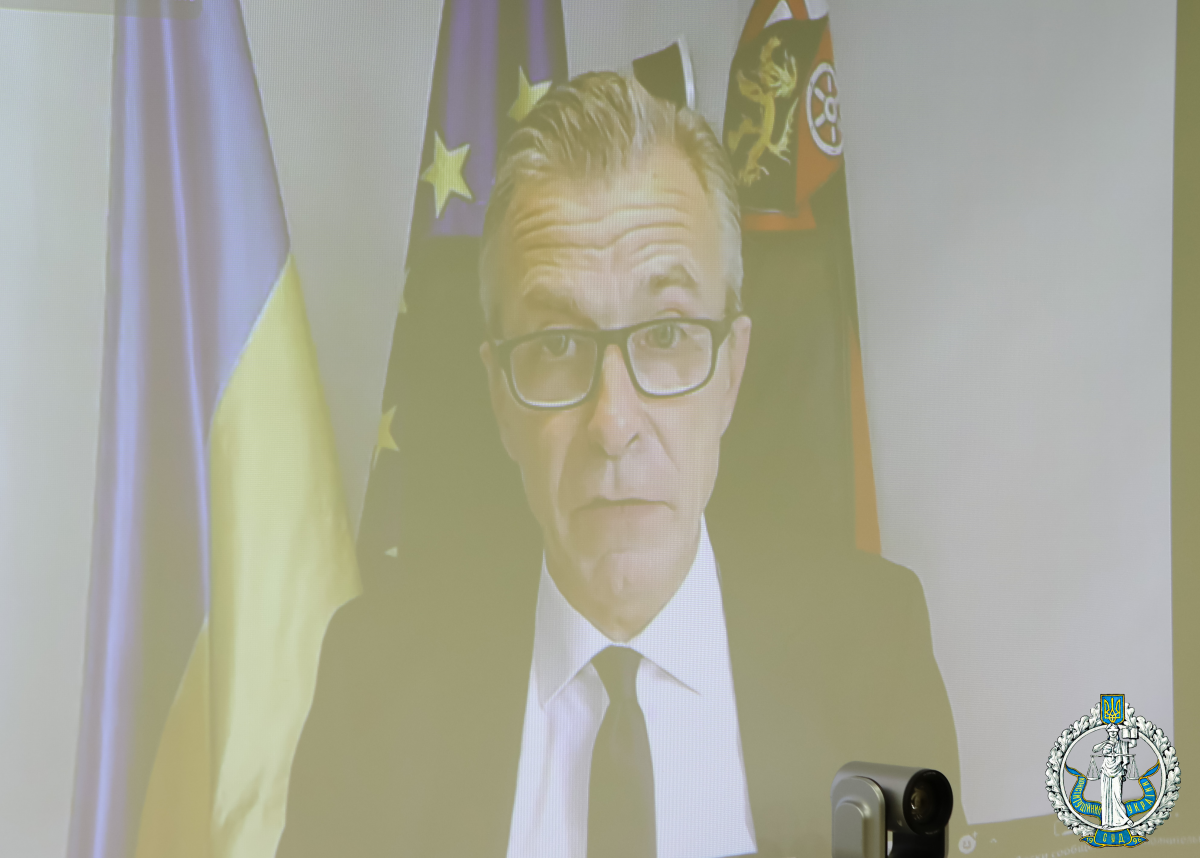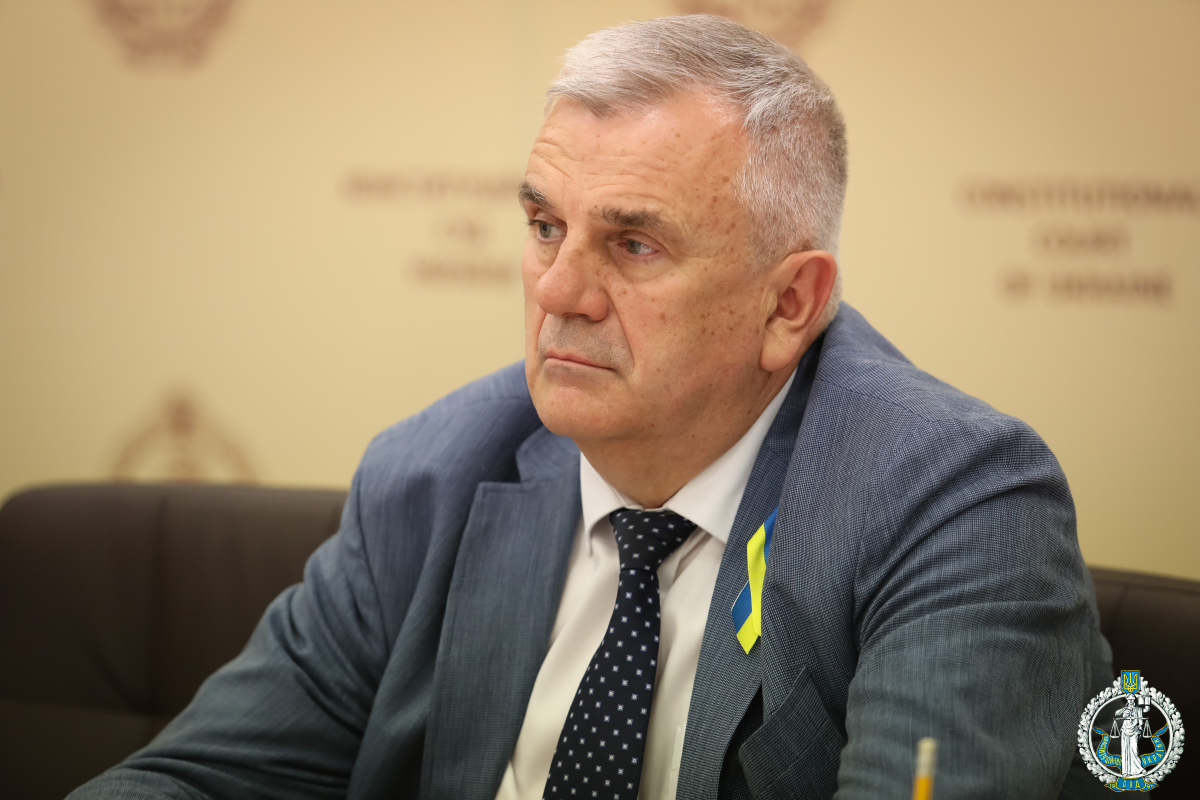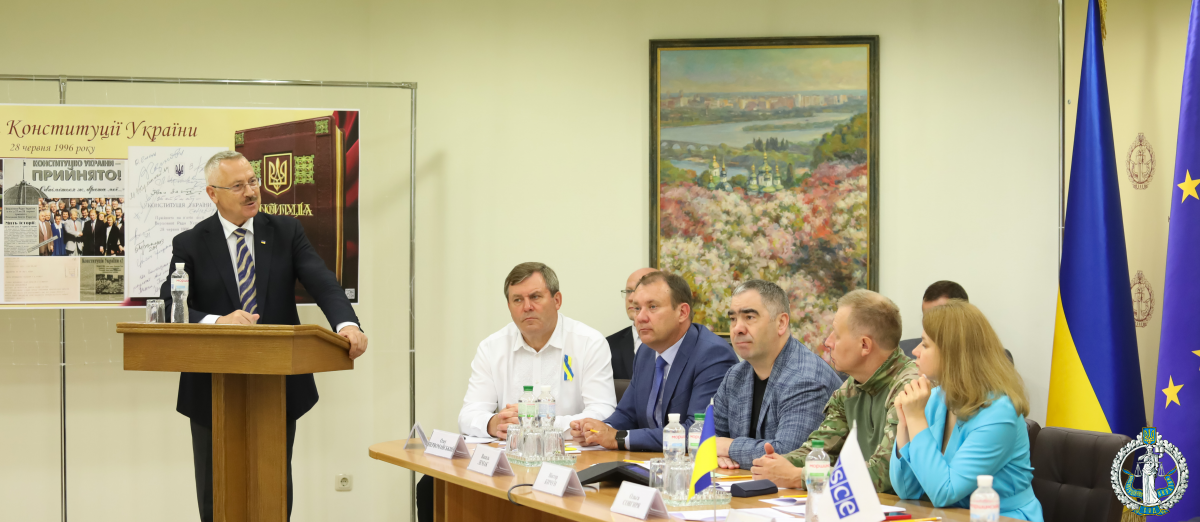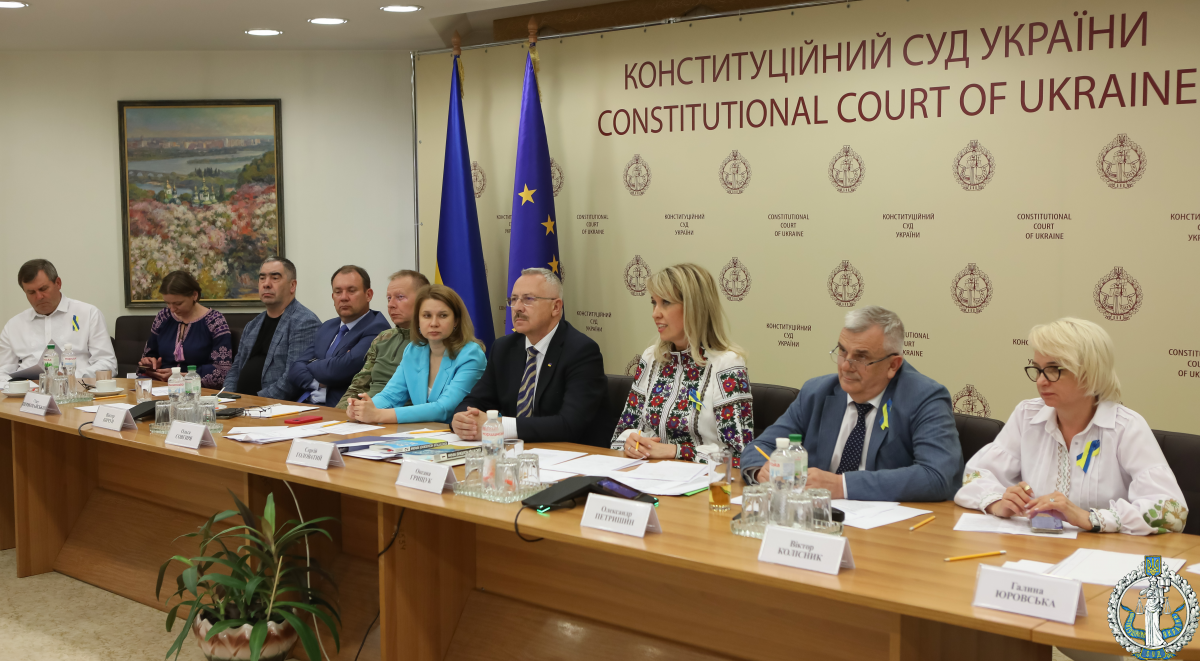On June 28, 2023, on the occasion of the Constitution Day of Ukraine, the International Conference „The Constitution of Ukraine and the Triad of European Values: a Eurointegration Perspective“ was held in a hybrid format, organised by the Constitutional Court of Ukraine jointly with the Council of Europe Office in Ukraine, the OSCE Support Programme for Ukraine and the German Foundation for International Legal Cooperation (IRZ).
The event was attended by judges of the Constitutional Court of Ukraine (hereinafter referred to as the Court or the CCU) and retired judges of the Court, national and international experts in the field of constitutional law, representatives of constitutional jurisdictions of foreign states and international organisations.
The Acting Chief Justice of the Constitutional Court of Ukraine Serhiy Holovaty delivered the welcoming address.
Serhiy Holovaty emphasised that June 28, 1996, has become a great day for democracy triumph in Ukraine. The Constitution of Ukraine as an Act of the constituent power of the people was born in a very fierce political struggle between political actors and institutions. Against all the obstacles of the then-ruling elite, the Parliament finally adopted the Constitution of Ukraine. „The event became a success both in spite of and due to certain reasons. Due to what reasons? Due to the willingness of the Ukrainian people to have their own statehood and its constitutional entrenchment,“ he added. In his words, the fact that the Verkhovna Rada of Ukraine adopted the Constitution of Ukraine in a democratic manner was an exception. Indeed, a number of other post-Soviet states adopted their constitutions by using a referendum as an instrument to install autocratic regimes. As Serhiy Holovaty noted, Ukraine had been also „on the waiting list“ to be imposed an autocratic constitution by referendum, initiated by the then autocratic ruler President Leonid Kuchma, «however, the Verkhovna Rada of Ukraine, regardless of the political affiliation of the deputies, managed to adopt the Constitution in a democratic manner. This is an example of how Ukraine is committed to democracy, yet even then, at a time of deep political crisis and confrontation during the „constitutional night“... democracy had prevailed.»
In his welcoming remarks, Serhiy Holovaty also highlighted the importance of the chosen topic of the International Conference, „The Constitution of Ukraine and the Triad of European Values: a Eurointegration Perspective“. He believes Ukraine has been granted the status of a candidate for the European Union membership, „thus having to be unconditionally committed to the triad of European values, i.e. democracy, human rights and the rule of law“.
In this context, the Acting Chief Justice of the Constitutional Court of Ukraine underlined that this event is a great opportunity not only to celebrate Constitution Day, at the same time it is a perfect platform to discuss the issues of ensuring the sustainability of European values and their effectiveness in Ukraine.
He mentioned that the Constitutional Court of Ukraine would never stop fulfilling its duty to ensure the ultimate legal authority of the Constitution as the Act of the constituent power of the people that provides a solid foundation for genuine democracy, protection of human rights and respect for the rule of law in Ukraine.
Videospeech of Serhiy Holovaty is available
Wolfram Hertig, Senior Project Manager of the German Foundation for International Legal Cooperation (IRZ), Deputy Head of the Eastern Europe Department, also made a welcoming address to the participants of the event. On behalf of the German Foundation for International Legal Cooperation (IRZ), he congratulated the participants on the 27th anniversary of the Constitution of Ukraine and expressed his wishes for peace, security and the restoration of Ukraine’s territorial integrity.
Wolfram Hertig pointed out that Constitution Day is of particular importance. „The whole world is impressed with how Ukraine and the Ukrainian people are defending freedom and democracy, how you are continuing legal reforms even in these difficult conditions, which is deeply respectful,“ Wolfram Hertig said.
The speaker emphasised the continuation of close and intensive cooperation with the Constitutional Court of Ukraine to approximate national legislation to the EU legislation.
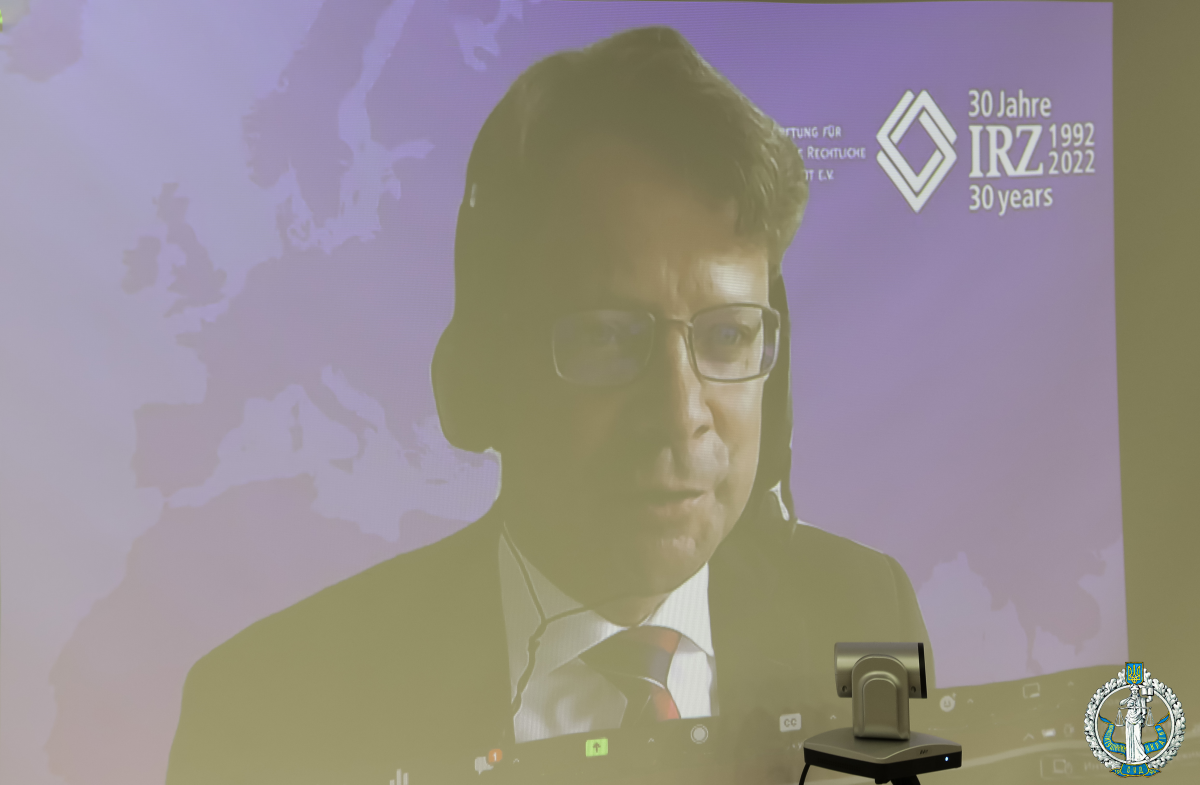
Videospeech of Wolfram Hertig is available
Pierre Baussand, OSCE SPU Support Programme Manager, addressed the participants of the event, stressed that the OSCE is committed to strengthening the platform for dialogue, and reaffirmed its full solidarity with the Ukrainian people in these challenging times.
„We seek to support the democratic and social resilience of Ukraine’s institutions, as well as the unity of civil society and the people of Ukraine. We highly appreciate the strength of our Ukrainian partners, in particular the Constitutional Court of Ukraine, and your determination to continue to uphold the values of democracy, human rights and the rule of law. Our common values are enshrined in international instruments, in particular the Helsinki Final Act,„ said Pierre Baussand.
He remarked that these values have been inspiring and guiding for almost 50 years, especially in times of war and armed conflict, the triad of European values is called upon to play a crucial role. The contribution of constitutional courts to the protection of these values cannot be overestimated.
In his welcoming address, Pierre Baussand spoke about the longstanding experience of successful cooperation between the OSCE and the Constitutional Court of Ukraine aimed at ensuring better access to constitutional justice, achieving gender equality and protecting vulnerable groups.
Over the course of three sessions, the participants discussed the triad of European values: democracy, human rights and the rule of law.
Videospeech of Pierre Baussand is available
During the first session „Democracy‟, judge of the Constitutional Court of Ukraine Olha Sovhyria, moderator of the session, extended her gratitude to the Armed Forces of Ukraine, who, with their incredible courage, defend European values on the battlefield against the aggressor and thus make it possible to hold such events.
She focused on the analysis of the legal positions expressed by the Constitutional Court of Ukraine on the principle of democracy, observing that „democracy is one of the core European values, and its implementation in practice in the rapidly changing conditions of today requires a constant intellectual search for solutions to pressing problems“.
Carolyn Hammer, Rule of Law Advisor at the OSCE Office for Democratic Institutions and Human Rights (ODIHR), talked about the role of constitutional justice in strengthening democratic institutions, respect for human rights and the rule of law.
The presenter emphasised that ODIHR provides support to 57 OSCE participating States in relation to their commitments to democratic elections, respect for human rights, tolerance, non-discrimination, etc. She stressed that in the wake of the russian military attack and its consequences for the civilian population, ODIHR will make every effort to provide appropriate and timely support to Ukraine.
Constitutional justice, she added, plays a pivotal role in strengthening democratic institutions, promoting the rule of law and ensuring that human rights are respected.
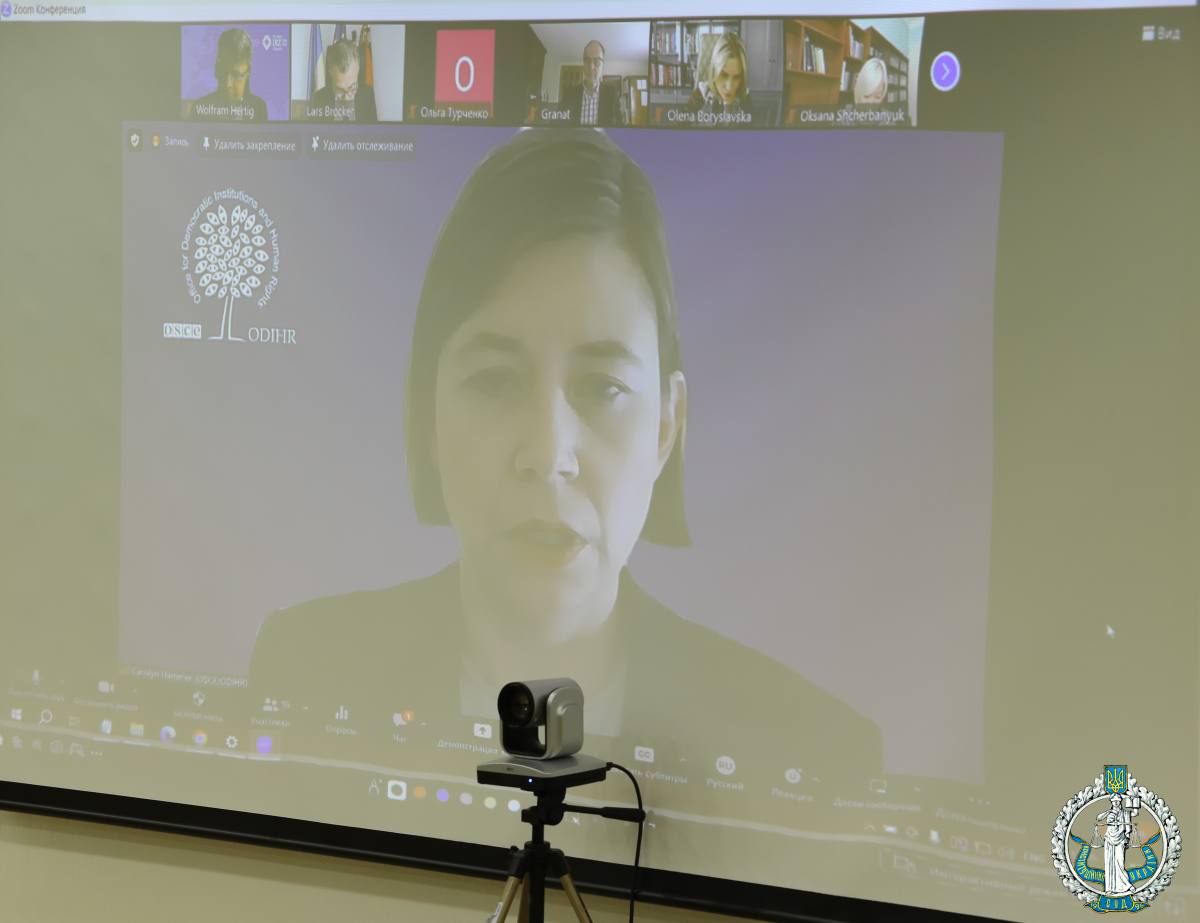
Vasyl Lemak, judge of the Constitutional Court of Ukraine, in his presentation “Constitutional power in times of war: first lessons of Ukraine”, argued that constitutional democracy in Ukraine survived the first period of war, as Ukrainian society has freely elected legitimate constitutional institutions that are functioning. “On the first day of the full-scale aggression, Kyiv was under rocket and air shelling, however, this did not prevent the constitutional mechanisms for the introduction of martial law from being used. The steps envisaged by the Constitution of Ukraine were taken to launch the mechanisms on which the functioning of the constitutional martial law is based.”
In his presentation, the judge also outlined the main conclusions that can be drawn from the difficult months of the war. According to him, it is necessary to preserve and strengthen the institutional capacity of all branches of government. In this context, he mentioned that the daily and effective work of the Constitutional Court of Ukraine is to provide a presumption of constitutionality to acts aimed at conducting a successful war by Ukraine. In addition, he believes the constitutional authorities should work proactively during the war, and the main acts and state programmes related to martial law should be adopted in advance. The speaker explained that it is important to maintain the balance of power, “There are red lines that cannot be crossed even in times of war. In particular, no one can substitute the parliament in adopting laws, and the parliament and the executive branch cannot in any way substitute the judiciary with their decisions”.
The participants of this session also debated on the responsibility that constitutionalism holds for the future of the state and society, the correlation between democracy and other constitutional values in times of war, the principle of separation of powers in official constitutional doctrine, and the role of democratic institutions in times of war in the context of European integration.
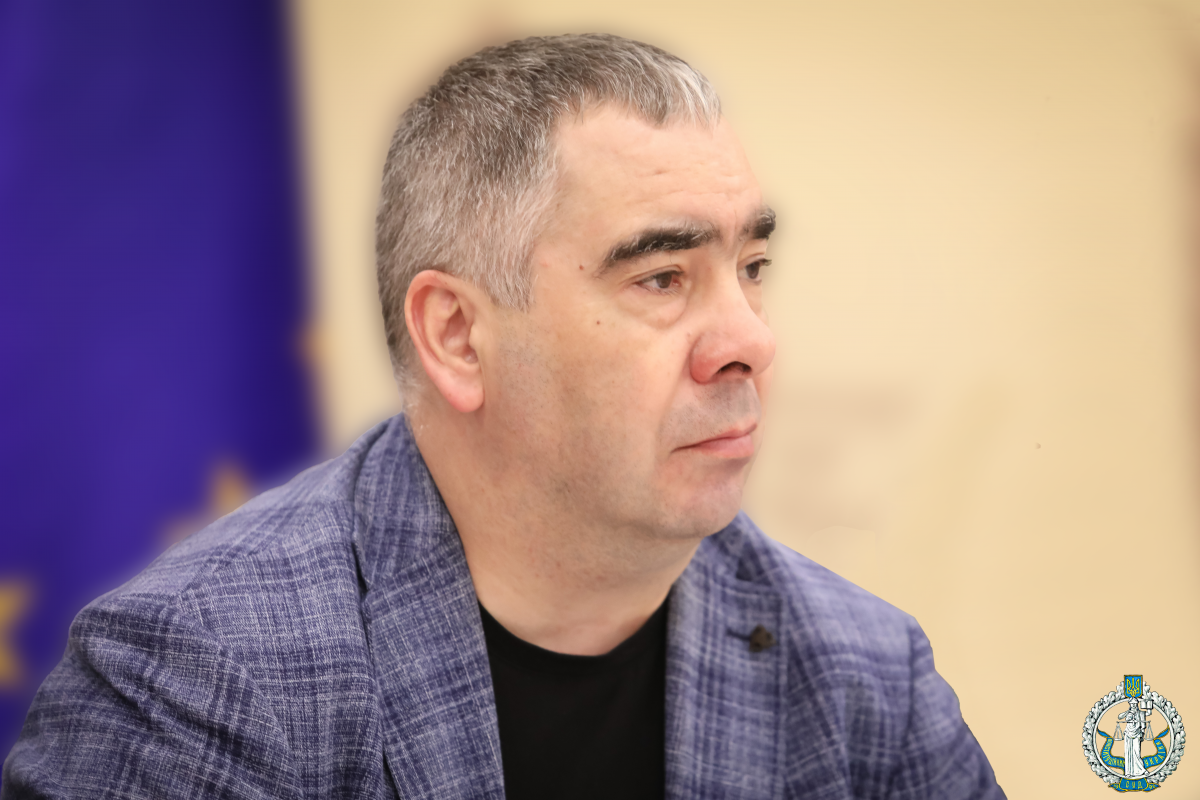
Oleksandr Vodiannikov, Senior Project Assistant of the OSCE Support Programme for Ukraine, special adviser to the Constitutional Court of Ukraine, Mirosław Granat, Special Advisor of the Constitutional Court of Ukraine, Professor, Head of the Department of Constitutional Law of the University of Cardinal Stefan Wyszyński, Former Judge of the Constitutional Tribunal of the Republic of Poland, Olena Boryslavska, Professor of the Department of Constitutional Law, Faculty of Law, Ivan Franko National University of Lviv, Chief Co-Editor of the Ukrainian Journal of Constitutional Law, Doctor of Law, Professor, Iurii Barabash, Vice-Rector for Research and Academic Affairs and Strategic Development of the Yaroslav Mudryi National Law University, Doctor of Law, Professor, Corresponding Member of the National Academy of Legal Sciences of Ukraine, Yuliia KYRYCHENKO, member of the Board of the Centre of Policy and Legal Reform, Head of Constitutional Law Projects, Co-Chair of the Board of the Reanimation Package of Reforms took part in the expert discussion.
During the next session Mykola Gnatovskyy, judge of the European Court of Human Rights in respect of Ukraine delivered the presentation „Constitutional Court of Ukraine and European Court of Human Rights: Distribution of Roles in Ensuring the Protection of Human Rights in Ukraine“.
The speaker emphasised that the Constitutional Court of Ukraine is a key body, which is called to ensure the observance of human rights in the state, and its role is fundamental.
He also noted that the ECHR has been applying the principle of subsidiarity for a long time, and with the entry into force of Protocol No. 15 to the European Convention on Human Rights in August 2021, this principle was included in its Preamble, just as the European Atlantic choice of Ukraine was included in the preamble of the Constitution of Ukraine.
The speaker also added that the ECtHR emphasises the primary role of the state in the protection of human rights and freedoms, as well as the fact that their protection should first of all be carried out by domestic courts.
Mykola Gnatovskyy noted that the Constitutional Court of Ukraine is an important partner for the European Court of Human Rights and expressed hope that the institution of constitutional complaint will become an effective means of legal protection of individuals at the national level.
During the second session, presentations were also delivered by George Papuashvili, Special Advisor of the Constitutional Court of Ukraine, Professor of Law at Ilia State University, President of the Constitutional Court of Georgia (2006-2016), a former Member of the European Commission „For Democracy through Law“ (Venice Commission), Vitalii Kovalchuk, Head of the Department of Constitutional and International Law of the Educational and Research Institute of Law, Psychology and Innovative Education of Lviv Polytechnic National University, Doctor of Law, Professor, Serhii Riznyk, Vice-Rector for Scientific and Pedagogical Work and International Cooperation of the Ivan Franko National University of Lviv, Doctor of Law, Professor, Volodymyr Ustymenko, member of the Presidium of the National Academy of Sciences of Ukraine, Director of the State Organisation „V. Mamutov Institute of Economic and Legal Research of the National Academy of Sciences of Ukraine“, Corresponding Member of the National Academy of Sciences of Ukraine, Olena Frolova, Representative of the Ukrainian Parliament Commissioner for Human Rights for the Judiciary on the Right to Fair Justice and Representation in the Constitutional Court of Ukraine. The session was moderated by the judge of the Constitutional Court of Ukraine Oleh Pervomaiskyy.
The participants discussed the role of the Constitutional Court in establishing the European concept of human rights, in particular the practice of Georgia; constitutionalism in the conditions of war, namely how the struggle for values, rights and identity takes place; narrowing of the content and scope of human rights during the adoption of normative acts as a basis for their unconstitutionality; threats to the implementation of the constitutional right to education in the conditions of martial law; parliamentary control over the observance of constitutional human rights and freedoms, etc.
The participants of the third session discussed the principle of the rule of law.
The judge of the Constitutional Court of Ukraine, Oksana Hryshchuk, who moderated the session, developed the principle of the rule of law in the legal positions of the Constitutional Court of Ukraine, in particular, analysed its development in the Court's decisions over the past years.
The judge emphasised the importance of the Court's Decision (No. 5-r(II)/2020), adopted in June 2020 in the case upon the constitutional complaint of citizen of Ukraine Olha Levchenko, in which the Ukrainian formula of the rule of law is presented. In particular, the text of the Decision states that “Rule of law” is an inseparable element of the system of values that is the basis of the modern European legal order, belongs to the triad of principles of the common heritage of European peoples, along with such components as true democracy and human rights.
As Oksana Hryshchuk noted, the Decision of the Constitutional Court of Ukraine (No. 5-r/2018) dated May 22, 2018, where the Court pointed to the ontological status of human dignity as a right guaranteed by Article 28 of the Constitution of Ukraine and a constitutional value that fills human existence with meaning, is the foundation for all other constitutional rights, the yardstick for determining their essence, the criterion for admissibility of possible limitations of such rights. Such an understanding, according to Oksana Hryshchuk, is extremely important, especially now in the conditions of military threats facing the Ukrainian State.
Lars Brocker, President of the Constitutional Court and the Higher Administrative Court of Rhineland-Palatinate, Germany, Doctor of Law, Professor, delivered the presentation „Decisions of the Federal Constitutional Court of Germany Regarding the Principles of the Rule of Law“.
In his speech, he cited examples of decisions of the Federal Constitutional Court of Germany in which the Court applied the rule of law principle.
During the speech, he also mentioned that justice should never adapt to politics, instead politics should adapt to justice. In this context, the speaker noted that in a democratic state governed by the rule of law, even the legislator is not completely free, but is bound by the supremacy of the constitution. Therefore, according to him, political activity is bound by the law, and therefore in the historical perspective, and in some places even today, there are lines of conflict between the principle of the rule of law and the principle of democracy. At the same time, Lars Brocker noted that this issue could mostly be resolved, because the basic law sees both principles in a logical relationship expressed by interdependence.
As the speaker pointed put, according to the position of the Federal Constitutional Court of Germany, the principle of democracy means the right of citizens to democratic self-determination. This necessarily requires the protection of minorities through legal means. The task of a democratic system is to ensure equal freedom for all.
Lars Brocker also informed that the Federal Constitutional Court of Germany clearly expresses the interaction and consistency of the principle of rule of law and democracy in all decisions according to the formula: a free legal state and a free democratic system. It is impossible to guarantee an established democracy without legal restrictions.
Judge of the Constitutional Court of Ukraine, Oleksandr Petryshyn, devoted his speech to the issue of interpreting constitutional norms in implementing the principle of the rule of law.
The speaker noted that one of the powers of the Constitutional Court of Ukraine is the official interpretation of the Constitution of Ukraine. He focused on the issue of official interpretation of legal norms.
According to Oleksandr Petryshyn, the concept of the outstanding American philosopher of law Ronald Dworkin, according to which “we establish the content of a rule of law when we interpret it in the context of a specific case” is not groundless and promising.
In addition, the speaker drew attention to the course of changes in the legislative regulation of the powers of the Constitutional Court of Ukraine regarding the interpretation of laws and the Constitution. Concluding his speech, the speaker emphasised the significant role of the Constitutional Court of Ukraine in the protection of constitutional human rights.
Alexandru Tănase, Special Advisor of the Constitutional Court of Ukraine, President of the Constitutional Court of the Republic of Moldova (2011-2017), former Member of the European Commission for Democracy through Law and Oksana Shcherbaniuk, Head of the Department of Procedural Law at the Law Faculty of Yuriy Fedkovych Chernivtsi National University, Professor of Vilnius University, Doctor of Law, Professor, presented their papers in the final session of the Conference.
The session participants discussed the role of constitutional courts in the protection of democracy in the modern world, discussed the interpretation of constitutional norms in the implementation of the rule of law principle, and the rule of law as a meta-principle of the EU constitutional system.
The video recording of the Conference is available at the link: https://www.youtube.com/watch?v=Y2BOZKXZWhc&t=7s

